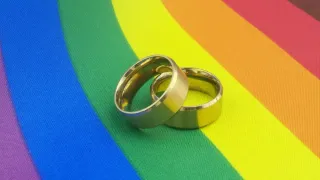December 7, 2023
Fear and Uncertainty for LGBTQ+ Russians in Wake of Supreme Court's 'Extremist' Ruling
Kilian Melloy READ TIME: 4 MIN.
Fear and uncertainty, already a fact of life for LGBTQ+ people in Russia thanks to steadily worsening oppression targeting non-heterosexual and non-cisgender people, has abruptly become worse – much worse – the Moscow Times reported.
Focusing on the LGBTQ+ residents of the Russian city of St. Petersburg, the Moscow Times reported that an "unprecedented" level of "uncertainty and fear" permeates what had previously been "one of the country's most LGBT-tolerant cities..."
One equality activist – a self-identified lesbian referred to only as Maria – told the publication that "People are scared," adding that, "They were already not so sure about their safety, and now it will be even worse."
These are dangerous times for all LGBTQ+ people in Russia, as well as anyone who advocates for the rights of gay and transgender people.
Much of the anxiety stems from the nebulous nature of Russia's homophobic laws and policies, which seem designed to apply to any aspect of gay life at the whim of authorities.
"No one knows anything," Maria said of the new legal reality. "I am waiting for advice from legal experts and then I'll decide what to do."
As previously reported, Russia's Supreme Court last week ruled that the "international civic LGBTQ+ movement" is "extremist," even though that ruling applies to no actual existing group.
The ruling is reminiscent of the way former American president Donald Trump attempted, during his single term, to label anti-fascism as a "terrorist organization," despite opposition to fascism being a philosophy, with no organization at all adopting that moniker.
"The vague nature of Russia's extremism laws, coupled with the lack of clarity around the definition of the 'international LGBT public movement,' has left many wondering whether simply openly identifying as gay or lesbian could now be grounds for prosecution," the Moscow Times noted.
The possibility looms that ordinary people who do something innocuous could be arrested and sentenced to a six-year prison term under the new "extremist" definition applying to the so-called LGBTQ "movement."
"A person goes out with a rainbow flag: That's it, he participated in the activities of the LGBT movement, up to six years in prison," a bisexual rights advocated identified only as Alexei told the publication.
Another LGBTQ+ Russian, Elena, wondered whether other everyday activities could also be cited as a reason for labeling otherwise ordinary citizens as "extremists." Elena wondered if it would be "safe to go to an LGBT-related event, party, or a drag show?" She went on to ask: "Is it safe to use online dating apps to meet an LGBT person now?"
"Russian human rights groups believe online activity carries the highest risk for average LGBT people," the Moscow Times detailed, "and recommended deleting all social media posts that could be interpreted as a sign of support for the community."
But any such deletions would have to be thorough: "Even years-old posts could be considered violations of the ban and lead to prosecution, according to legal experts," the newspaper noted.
"The Supreme Court ruling is the latest step in a decade-long crackdown on LGBTQ+ rights in Russia begun under President Vladimir Putin, who has put 'traditional family values' at the cornerstone of his rule," the Associated Press reported just after the court's ruling.
"After sending troops into Ukraine in 2022, the Kremlin ramped up its comments about protecting 'traditional values' from what it called the West's 'degrading' influence, in what rights advocates saw as an attempt to legitimize the war," the AP noted, going on to recall that in the "same year, the authorities adopted a law banning propaganda of 'nontraditional sexual relations' among adults... effectively outlawing any public endorsement of LGBTQ+ people."
Prior to 2022, a 2013 law had banned any such "endorsement" only in contexts where they might be viewed by minors.
Transgender people were also targeted by Russian lawmakers, the AP recounted, when a "law passed earlier this year prohibited gender transitioning procedures and gender-affirming care for transgender people.
"The legislation prohibited any 'medical interventions aimed at changing the sex of a person,'" the AP detailed, "as well as changing one's gender in official documents and public records. It also amended Russia's Family Code by listing gender change as a reason to annul a marriage and adding those 'who had changed gender" to a list of people who can't become foster or adoptive parents."
Despite such legislative attacks on the rights and liberties of LGBTQ+ people, Russian officials insist that gay and trans Russians are suffering no oppression. Deputy Justice Minister Andrei Loginov was one such official, declaring that "the rights of LGBT people in Russia are protected," the AP relayed.
Russian citizens have no illusions about the political nature of the increasingly homophobic legal environment in Russia, the newspaper relayed. "They see it as part of a government effort to consolidate Russian society under the banner of 'traditional values' ahead of next year's presidential election, in which Putin is widely expected to extend his rule until at least 2030."






